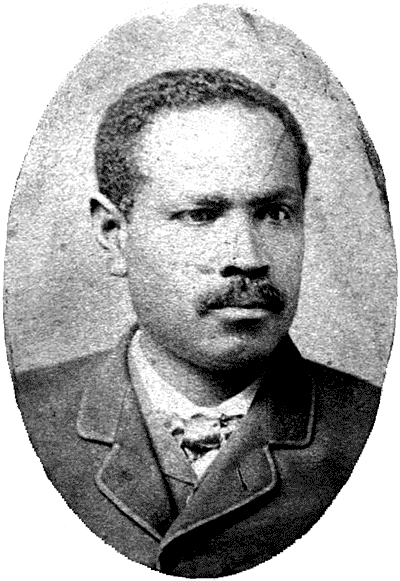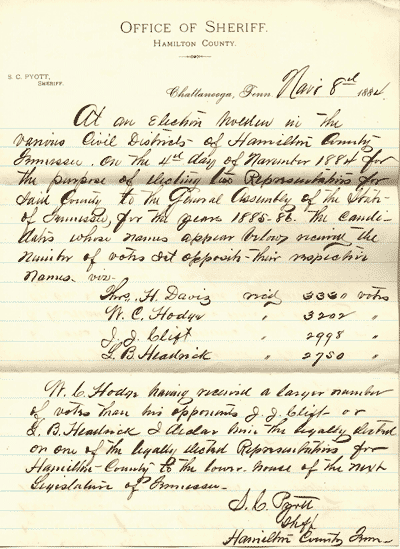 Hodge’s early years remain a mystery.
Hodge’s early years remain a mystery.
A man who held many jobs, from railroad agent to jailer, W. C. Hodge was elected to represent Hamilton County in the 44th Tennessee General Assembly, 1885-1886. Born in North Carolina, Hodge came to Tennessee as a stone mason and held a number of jobs around Chattanooga before he became a legislator: contractor, house mover, alderman for the 4th Ward of the City of Chattanooga (1878-1887), and city jailer.
Perhaps because Hodge’s surname was less distinctive than those of some of the other legislators, much of the available information about him has been ambiguous and difficult to verify. For example, there were no definite city directory entries for him before 1880 or after 1891, and his name appeared in only one credible census record (although even here, his surname was difficult to read – the first letter was indecipherable and did not match any other upper-case “H” on the page). In the 1880 census, he was identified as a stone cutter, a title that corresponds closely with his city directory entry the same year, which said he was a mason. He listed his birthplace as North Carolina, his age as 34, and his race as black. His wife’s name was Lou (22), and the couple had three young sons: Walter (4), Fred (1), and Eddy (5 months). Both adults were able to read and speak English, but Lou said she was unable to write. Unfortunately, almost certainly disproving the possibility that this was the State Representative’s family, we find a poignant article in the August 1, 1885, Huntsville Gazette: “Hon. And Mrs. W. C. Hodge of Chattanooga, mourn the loss of their only child.” The 1900 census for Chattanooga’s 4th Ward listed a Wm. and Lou Hodge, but they were identified as white!
Two additional records may be related to this family, although, once again, their connection to the legislator William Hodge are impossible to confirm. The first is a death record for William Hodge, a black male, who was born in 1851 and died in Chattanooga on May 21, 1916. Not only was this man’s birthdate a little late to suppose him to be our William C., but there are also two other problems with this record – this man was single and born in Georgia. The second possibly related record (although from a later generation) is a death certificate for a William C. Hodge, his race unspecified, who was born in 1899 and died in Chattanooga in 1953. His parents’ names are the only family information on the certificate – W. C. Hodge and Mary Staley.
Legislative service

(Tennessee State Library and Archives)
According to historian Joseph Cartwright, Chattanooga blacks were more effective in using their considerable numbers to persuade local white Republicans to share the available political capital. For example, William C. Hodge held a seat on the local Board of Aldermen, representing Chattanooga’s Fourth District, for the better part of a decade, beginning in 1878. During that same period there were “Negro fire companies, Negroes on the police force, Negroes on the board of education, a Negro militia company, a Negro city band, black justices of the peace, constables, deputy sheriffs, state legislators [2] and jurors, and a Negro circuit court clerk.” (Cartwright, 147-148) M. J. O’Brien, a Democratic candidate for mayor in 1881, courted the African American vote shamelessly: if black voters, he pledged, “stood by the Democrats half as faithfully as they did the Republicans, we would show them ten times the attention.” (Cartwright, 149) Black voters failed to be impressed by his claims, and O’Brien lost the election. One of the great bartering arenas between white politicians and black voters was the police department. The same year O’Brien’s mayoral bid failed, Democrats did win a majority of the Council seats, but the white Republicans boycotted the meetings. In order to have a quorum so they could do any business, the Democratic aldermen made a deal with Hodge, hiring four black policemen in exchange for his presence at council meetings. When the Republicans regained control of the council in the following election, they courted black voters by adding three more policemen – seven of the twelve Chattanooga policemen were now African Americans. (Cartwright, 149)
Hodge was a candidate for the Tennessee General Assembly in 1884, a year when Tennessee's Republicans had generally declared themselves opposed to black candidates. Given five minutes to introduce his candidacy to the Hamilton County Republican Convention, he commented that he had been a candidate many times before, when he represented his district on the city council.
We need good men to represent Hamilton county in the Legislature. I know that some leading Republicans argue that it won’t do to nominate a colored man, that it would weaken the ticket. I ask why? They say the white Republicans in the county haven’t got educated up to that yet. I have been to Nashville and seen colored men in the Legislature [Eight African American men had served in the General Assembly by this time.], and they have did themselves credit and did credit to their race. If you send me I will do my best. I have had the honor to represent you in the city, but no man yet has charged me with being a fool. I was beat the other day [in his run for another council term], because they say I had been there long enough. It do occur to me that in a county that votes 1,400 colored Republicans and 500 white Republicans, after 15 years, it is about time that we inquired why it won’t do to nominate a colored man. I have no charge to make on the Republican party; she have honored me a long time. If you don’t want me, give us some other colored man; we want a representative.” (Chattanooga Daily Times, October 12, 1884)
When Hodge actually won the nomination, many of the white Republicans threatened to bolt from the party and vote for an independent candidate. Returning fire, black leaders threatened to vote all the Republicans off the city council, reminding Chattanooga Republican office holders that it was the African American voters who kept them in office (Hamilton County black voters outnumbered whites 1,400 to 400) and suggested that a little reciprocity would go a long way. Hodge subsequently became the county's first black representative, with the grudging acquiescence of the Times: “We hope these Representatives will have the good sense and temper to consult the best men of their party in regard to their legislative work, and try their best to be useful to their constituents. If they are legally chosen, and we assume that much, the duty of the people is to make the best of the situation by giving them sound advice and correct information of their wishes and needs. It is not the part of sense to quarrel with the inevitable.” (November 6, 1884)
During Hodge’s legislative term he introduced bills to safeguard employment, particularly of road workers, to license and regulate life and accident companies in Tennessee, and to overturn Chapter 130 of the Acts of 1875, which permitted discrimination on public transportation and in hotels and places of public amusement. All his bills were tabled or rejected.
Newspapers often quoted Hodge, sometimes to ridicule his distinctive vocabulary. An article in the Nashville Daily American, reflecting on the final days of the 44th Legislature, opened with these words:
As the great representative, Sovereign Voice (with a big V) of the Forty Fourth General Assembly fades into an echo, the asperities of harsher criticism are so much softened down into what the Hon. Wm. Calvin Hodge, of Hamilton, (likewise of color) yesterday denominated ‘the spirit of filansophy,’ that we are almost persuaded that it hasn’t, after all, done quite as much harm as it might have done if it had continued in session fifteen or twenty days longer. This isn’t a very high compliment, but it’s the best we can do, with the material on hand.” (April 9, 1885)
Later years
There were a few news articles over the years that mentioned Hodge, in addition to the story about the death of his child. Hodge’s name was read into the record on Tennessee Day at the 1885 World’s Industrial and Cotton Centennial Exposition, but it is not clear whether he was actually in attendance there. And a humorous article in Justice on December 24, 1887, referred to Hodge’s service as a city jailer. The article was entitled “What They Want Santa Claus to Bring,” and wished “Mr. W. C. Hodge, another place as good as the jail.”
Between 1882 and 1891 William C. Hodge appeared in the Chattanooga city directories as a house mover and a member of the Board of Aldermen (1882-1883); a laborer (1886); the city jailer (1887); and a contractor (1889, 1891). There are no entries for him from 1892 to 1904, and none that can be verified after that time. The House biographical directory said he was at some point the night mail transfer agent at the railroad depot, later transferring to the East Tennessee, Virginia, and Georgia Railroad (based in Knoxville), which was in business from 1869 until its 1895 merger with the Richmond and Danville Railroad to form the Southern Railway. Looking at census records, there are few men who might possibly be William C. Hodge. There is a May 21, 1916, Tennessee death record for a William Hodge – “single, colored, age 65” – but he was probably a little young to be our Hodge, and the record states that he was born in Georgia. KBL 11/06/2012
__________
We would be delighted to hear from anyone who has verifiable information about the life and works of the Honorable William C. Hodge.
Sources:
Cartwright, Joseph H. The Triumph of Jim Crow: Tennessee Race Relations in the 1880s. Knoxville: University of Tennessee Press, 1976.
Chattanooga City Directories.
Chattanooga Daily Times: October 12, 13, 15, 1884; November 6, 1884.
Lovett, Bobby L. The Civil Rights Movement in Tennessee: A Narrative History. Knoxville: University of Tennessee Press, 2005.
_____ “A Profile of African Americans in Tennessee History: Introduction.” http://www.tnstate.edu/library/digital/document.htm
McBride, Robert M., and Dan M. Robinson. Biographical Directory, Tennessee General Assembly, Volume II (1861-1901). Nashville:
Tennessee State Library and Archives, and Tennessee Historical Commission, 1979.
“News and Sentiment,” Huntsville Gazette, August 1, 1885. Tennessee General Assembly. Journal of the House of Representatives of the
State of Tennessee. Nashville: Tavel and Howell, 1881, 1883.
“What They Want Santa Claus to Bring,” Justice, December 24, 1887.
“World’s Exposition—A Busy Day at the Grounds—Celebration by the Temperance Women. Continuance of the Session of the Immigration
Convention.” Times-Picayune, March 14, 1885.
